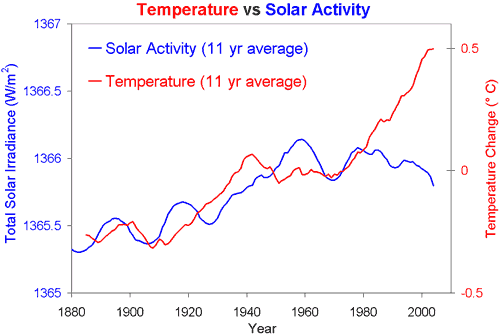Is the sun causing global warming?
Posted on 18 August 2010 by John Russell
This post is the Basic version (written by John Russell) of the skeptic argument "It's the sun".
Until about 1960, measurements by scientists showed that the brightness and warmth of the sun, as seen from the Earth, was increasing. Over the same period temperature measurements of the air and sea showed that the Earth was gradually warming. It was not surprising therefore for most scientists to put two and two together and assume that it was the warming sun that was increasing the temperature of our planet.
However, between the 1960s and the present day the same solar measurements have shown that the energy from the sun is now decreasing. At the same time temperature measurements of the air and sea have shown that the Earth has continued to become warmer and warmer. This proves that it cannot be the sun; something else must be causing the Earth's temperature to rise.

So, while there is no credible science indicating that the sun is causing the observed increase in global temperature, it's the known physical properties of greenhouse gasses that provide us with the only real and measurable explanation of global warming.
Note: we're currently going through the process of writing plain English versions of all the rebuttals to skeptic arguments. It's a big task but many hands make light work. If you're interested in helping with this effort, please contact me.































 Arguments
Arguments
























 0
0  0
0







Comments